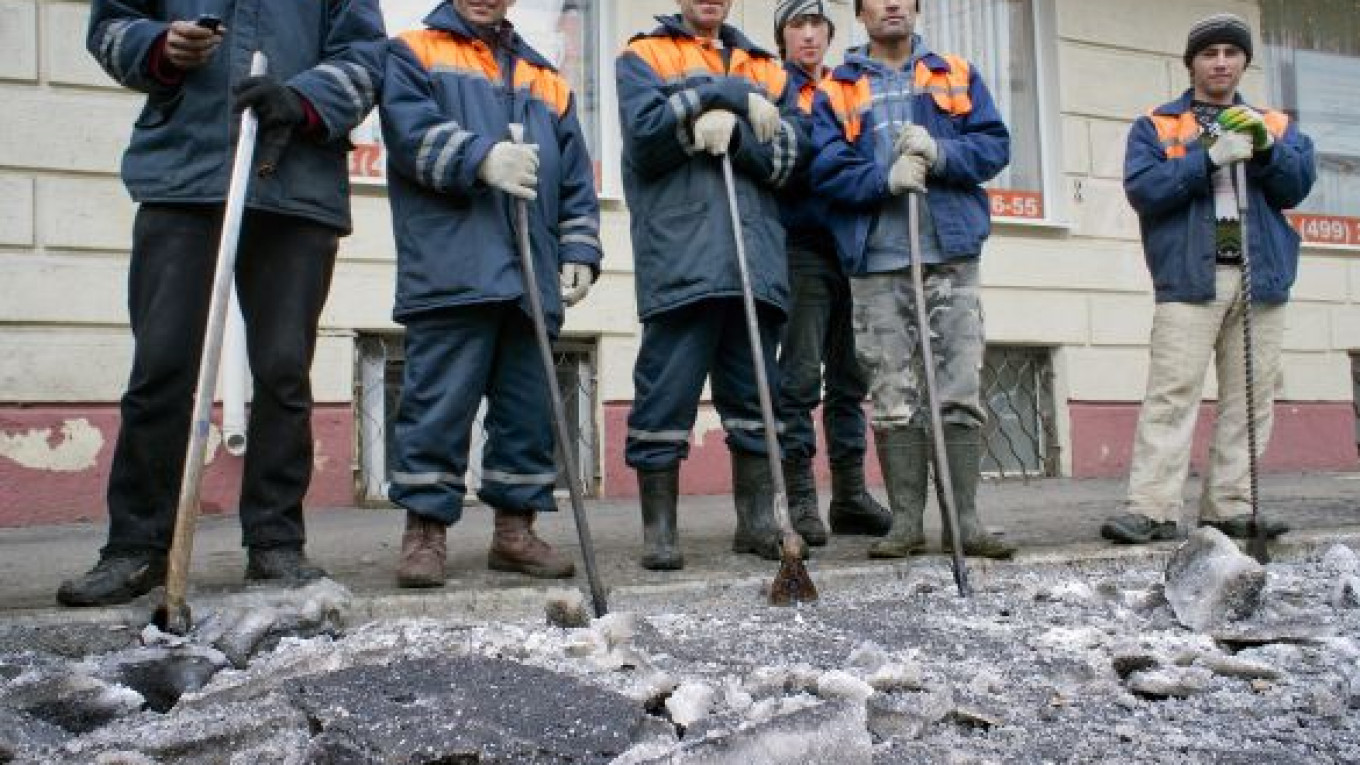The Russian Orthodox Church and the Federal Migration Service have joined forces to teach migrants Russian language and culture in what could be an attempt by religious leaders to attract more believers and financing from the state, an analyst said.
Migrants are invited to take free lessons in Russian language, culture, history and the basics of migration laws provided by a joint project, Maxim Parshin, head of the joint commission of the church and the migration service, told a news conference in Moscow on Monday, connected through video links to similar events in St. Petersburg, Kazan and Tomsk.
A federal law that came into force in December institutes a requirement for migrants to pass a Russian language test to get a job in the communal services and retail sectors.
The new project, called "Enlightenment: The Language and Cultural Adaptation of Migrants," started on a trial basis in December in several regions, including Krasnodar in southern Russia and Khabarovsk in the Far East.
Migrants will study using a textbook that will appear online in the next one to three weeks, Parshin said.
Moscow Patriarchate official Vsevolod Chaplin said the project was "not a missionary one."
"At the same time, it is evident that the acquaintance of migrants with the life of the country, with our society, is impossible without getting acquainted with its religious traditions," he told the news conference.
"The integration of religious migrants into the life of Russia's traditional religious communities is very important — the Orthodox community, the Muslim community and others," Chaplin said.
Last year, then-President Dmitry Medvedev ordered a tender to provide state financing to NGOs that take part in developing civil society institutions, and the joint project of migration and church officials emerged a winner, receiving partial support through a presidential grant.
Asked by a reporter whether communities preaching different religions could compete for potential followers, Chaplin said religious communities had so much work to do with migrants that they had no time to think about competition. At the same time, he urged communities of different belief systems to focus on non-religious migrants.
"The Orthodox Church, with the support of the Federal Migration Service, is going to convert migrants to Orthodoxy," said Roman Lunkin, an expert on religion at the Institute of Europe of the Russian Academy of Sciences.
By educating migrants, the church also apparently hopes to get more state financing from funds allotted as part of a 2010 law that stipulates support for "socially oriented" nongovernmental groups.
About 10.5 million foreigners currently live in Russia, most of them natives of Central Asia, Anatoly Fomenko, deputy head of the Federal Migration Service, told the news conference.
According to official data, there are around 3.5 million illegal migrants in Russia.
Young migrants often aren't well-versed in Russian language, laws or culture.
"All of this, unfortunately, leads to certain negative consequences linked to the violation of the rights of migrants themselves, the criminalization of the migrant sphere, the formation of a shadow labor market, the appearance of xenophobia and interethnic conflicts," Fomenko said.
Contact the author at n.krainova@imedia.ru
Related articles:
A Message from The Moscow Times:
Dear readers,
We are facing unprecedented challenges. Russia's Prosecutor General's Office has designated The Moscow Times as an "undesirable" organization, criminalizing our work and putting our staff at risk of prosecution. This follows our earlier unjust labeling as a "foreign agent."
These actions are direct attempts to silence independent journalism in Russia. The authorities claim our work "discredits the decisions of the Russian leadership." We see things differently: we strive to provide accurate, unbiased reporting on Russia.
We, the journalists of The Moscow Times, refuse to be silenced. But to continue our work, we need your help.
Your support, no matter how small, makes a world of difference. If you can, please support us monthly starting from just $2. It's quick to set up, and every contribution makes a significant impact.
By supporting The Moscow Times, you're defending open, independent journalism in the face of repression. Thank you for standing with us.
Remind me later.






